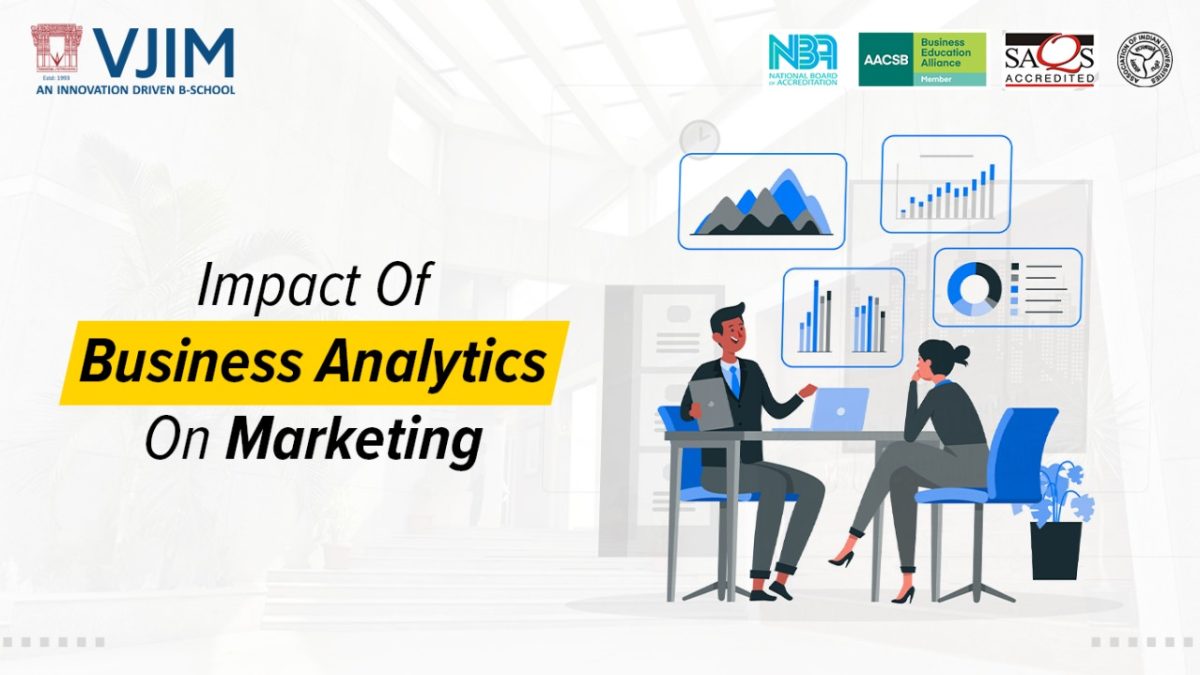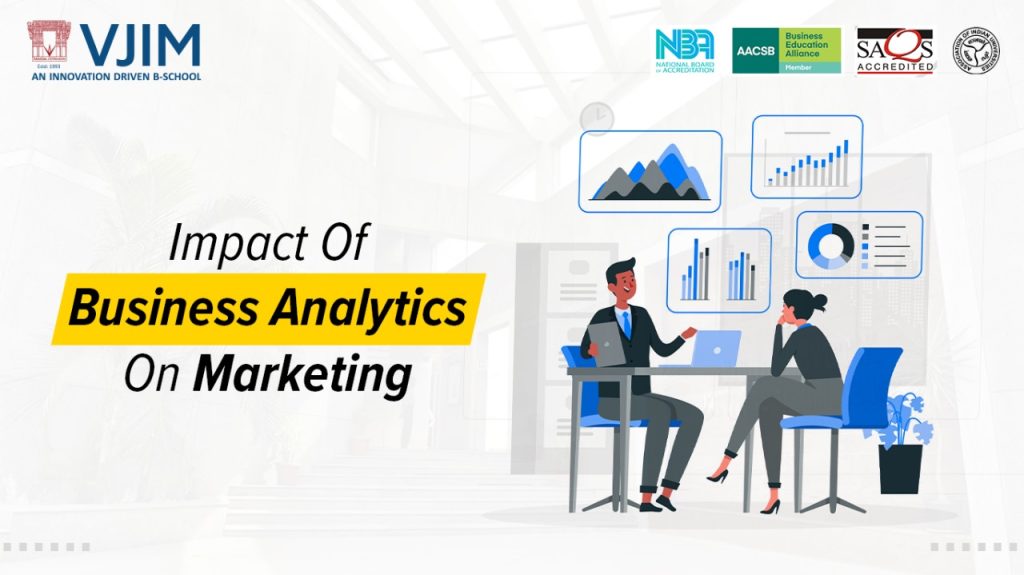In today’s technology-driven world, businesses are flooded with data from various sources, such as customer interactions and market trends.
Amidst this data deluge, the use of business analytics has become a crucial tool for marketers to unlock actionable insights and drive strategic decision-making.
The following blog delves into the ways in which business analytics and data science can provide a competitive edge for businesses and marketing efforts.
What is Business Analytics?
Business analytics is a holistic approach that combines various skills, technologies, and practices to analyze an organization’s data and performance. The primary objective is to uncover valuable insights and emerging trends within the data to support informed, data-driven decision-making. Through the practical application of analytics, businesses can refine their strategies and pinpoint the most advantageous opportunities, ultimately leading to increased revenue.
The core purpose of business analytics is to identify potential opportunities that empower a company to boost its revenue, whether through increased sales, cost savings, or the optimization of existing processes.
- To analyze data from several sources and data centers. Data needs to be extracted from their existing online interfaces and marketing tools.
- Extracting data will enable businesses to leverage advanced analytics and statistics, aiming to uncover valuable patterns. These patterns can be instrumental in identifying and understanding customer purchasing behaviors, providing crucial insights for the business.
- Business analytics also plays a crucial role in monitoring key performance indicators (KPIs) and real-time changes, allowing businesses to adapt their strategies or products in response to customer preferences and marketing performance.
Approaches Of Business Analytics
Descriptive
In the field of descriptive analytics, analysts use previous data and indicators of key performance to uncover trends and patterns, with the goal of gaining a comprehensive understanding of current conditions in comparison to the past. Analysts use data aggregation, data mining tools essential for business analytics.
Organizations commonly use this type of business analytics to gain a nuanced understanding of customer behavior, enabling them to develop more effective marketing strategies.
Diagnostic
The diagnostic business analytics technique leverages historical performance data to recognize and comprehend the factors driving particular trends proactively. Through the use of methodologies such as drill-down, data discovery, data mining, and correlation, analysts can gain valuable insights into specific events and uncover their root causes. This proactive approach allows for the utilization of classification and regression algorithms to identify patterns and predict future occurrences.
Predictive
Predictive analytics effectively leverages statistical methods to forecast and assess future outcomes. Analysts skillfully utilize machine learning and statistical models to make accurate predictions, seamlessly complementing descriptive analytics by identifying the probability of specific events or activities. This valuable analytical practice is commonly used by sales and marketing professionals.
Prescriptive
The prescriptive analytical method helps us understand how to tackle a situation in the future. “Prescriptive” means correcting the situation or taking precautions to achieve the desired outcomes. This method involves using deep learning analytical methods.
The Significance of Business Analytics in Marketing
Business analytics involves the systematic gathering, analysis, and interpretation of data to unveil valuable insights that inform important business decisions. When applied to marketing, this approach allows marketers to better understand consumer behavior, spot trends, and effectively measure the impact of their campaigns. By leveraging data-driven insights, marketers can refine their strategies, enhance customer engagement, and achieve better outcomes.
Data Collection and Management
Collecting comprehensive data from a variety of sources, including customer interactions, website analytics, social media platforms, and market research, is crucial for effective business analytics. This data encompasses demographic information, purchasing behavior, and engagement metrics, among other pertinent details. By consolidating and organizing this data, marketers can have a deep understanding of the market and target audience.
Data Analysis and Interpretation
After gathering information, a thorough analysis and interpretation is required to unveil key insights. Employing advanced analytical techniques such as predictive modeling, segmentation, and sentiment analysis is essential for marketers to understand correlations, patterns, and trends within the data. Customer preference helps identify new business opportunities, and foreseeing future behavior, marketers can make informed decisions and adapt their strategies for optimal outcomes.
Application in Marketing Strategies
Business analytics is crucial for guiding marketing from planning to execution, evaluation, and optimization. It shapes targeted campaigns, enables real-time monitoring, and provides valuable feedback for refining future strategies and measuring ROI.
Challenges and Considerations
The advantages of using business analytics in marketing are clear, but there are also challenges to consider. It’s important for marketers to address data privacy, security concerns, and data quality challenges proactively and implement strategies to minimize risks while maximizing the value of their data assets.
Uses of Business Analytics in Marketing
Find the Business Trends
Big data analytics in business helps identify trends in data, informing marketing strategy changes. It involves pinpointing popular content, top customers, and effective channels and addressing product or service issues before they escalate.
Understand the target audience in detail
Business analytics allows marketers to understand their target audience by analyzing social media posts and browsing history. This information helps marketers determine the types of customers they want and how to reach them through social media ads and online marketing tactics.
Efficiently spend the marketing budget
Data analytics in business is significant. It allows marketers to allocate their marketing budget more effectively by providing valuable data for informed decision-making and performance assessment. For example, when evaluating a new advertising campaign, marketers can analyze data to gauge ad clicks and customer conversions, enabling them to make informed decisions about the campaign’s success and future strategies.
Generate marketing reports in real-time
The utilization of big data analytics is essential in driving business impact by collecting, analyzing, and reporting data to improve business performance. Business analytics includes various practices such as data mining and predictive analysis. Business analytics in marketing is crucial for generating real-time updated reports, allowing for seamless integration of new information into reports at any time of day.
Improve customer experience
Big data analytics help in enhancing customer experience, and understand customers’ actions and their behaviour. With this information changes can be made to enhance the experience for everyone, especially new customers.
PGDM Business Analytics At VJIM
Data comes in various forms such as numbers, text, images, sounds, and videos. The global economy is shifting towards AI and ML-driven operations, with widespread use in sectors like healthcare, agriculture, and service delivery. PGDM Business Analytics program prepares students for roles like Analytics Manager, Data Scientist, and Data Engineer. VJIM offers courses integrating analytics skills into functional areas like Marketing, Finance, HR, and Operations, including MS Excel, RDBMS, Tableau, Big Data, R programming, and Machine Learning.
PGDM Marketing At VJIM
The PGDM program at VJIM covers a wide range of courses, including foundational and elective subjects such as Marketing Management, Sales and Distribution, Services Marketing, Brand Management, and Rural Marketing. It also includes advanced courses like Marketing Metrics and Analytics. The department organizes guest lectures, conclaves, and offers training programs and consultancy services for organizations. VJIM’s curriculum covers core and contemporary topics in marketing, and the institute ensures exceptional value delivery through various programs and seminars.
Conclusion
Integrating business analytics into marketing leverages, data-driven insights,enables marketers to make informed decisions, optimize strategies, and achieve marketing goals with precision and effectiveness. Embracing business analytics will be imperative for businesses aiming to thrive in an increasingly data-centric society as the digital landscape continues to evolve.
About VJIM
PGDM, from Vignana Jyothi Institute of Management, is in huge demand as it is approved by AICTE, accredited by the National Board of Accreditation (NBA) and the South Asian Quality Assurance System (SAQS).
The faculty at VJIM are Exceptional Scholars in their disciplines, Impactful consultants, Award-winning Case writers, and Renowned Corporate and Policy Advisers.
The syllabus at VJIM indulges in Research and development. It has a cutting-edge curriculum, industry internships, international exposure, and much more.
Admissions to PGDM are now open at VJIM.
▶ Contact Details for admissions to join VJIM – 9849800819
▶ VJIM Website Link:- https://vjim.edu.in/










